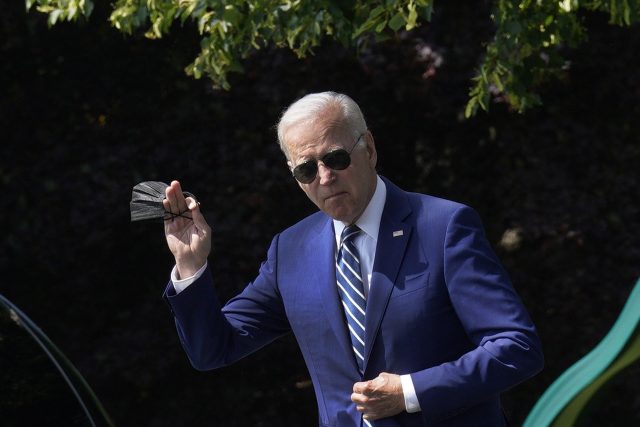The Federal Reserve, the Biden administration, and Wall Street’s economists are confident that inflation will be brought down over the coming year. The American public disagrees.
Two-thirds of Americans say they expect inflation to get worse over the next year, according to a poll conducted by The Washington Post and George Mason University’s Schar School of Policy and Government.
Inflation surged to a 40-year high in March, with the overall price level rising 8.6 percent in the past year. The April report on consumer prices showed only a slight moderation to an 8.3 percent price hike compared with the prior April. That is expected to tick down to 8.2 percent when the Bureau of Labor Statistics reports prices for May on Friday.
Thirty percent of households say they think inflation will get much worse over the next 12-months. Another 36 percent say the situation with rising prices will get somewhat worse. Ten percent said they expect inflation to remain about the same. Only 21 percent expect inflation to improve somewhat and 7 percent expect inflation to get much better.
Wall Street economists think the rate of inflation peaked in March and will be lower by the end of the year and continue to fall next year, even if it remains elevated compared with the past two decades and above the Fed’s target of an average of two percent. Bank of America economists have forecast U.S. inflation falling to a 12-month increase of 6 percent by December.
Federal Reserve officials were also optimistic at their March meeting. They use a measure called the Personal Consumption Expenditure price index to target and forecast inflation. This tends to run below CPI and showed prices were up 6.6 percent in March. Core PCE inflation, which excludes food and fuel, was up 5.2 percent. In the March projections, the median estimate from Fed officials was for PCE inflation to fall to 4.3 percent by year end and for core inflation to drop to 4.1 percent.
The Fed did not release projections at its May meeting but its forecast for year-end inflation are expected to move up at the June meeting scheduled for next week. In an effort to combat inflation, the Fed hiked its interest rate target by 25 basis points in March and 50 basis points in May. It is expected to hike by another 50 next week and again at the July meeting. The Fed is also shrinking its balance sheet by not replacing bonds as they mature, allowing a $47.5 billion run off this month and through the summer, moving up to $95 billion in September.
The Congressional Budget Office recently projected PCE inflation would rise 4.0 percent this year, an even rosier forecast than the Fed’s. President Joe Biden’s budget, which was released in March, forecast CPI to rise 4.7 percent this year and just 2.3 percent next year.
Thirty-seven percent of Americans say high prices are a major source of financial distress for their household. Fifty percent more say they are a minor source of financial distress.
Nearly 9 in 10 Americans say they are coping with high prices by looking for cheaper products. Around three-quarters report cutting back on restaurants and entertainment. Seventy-four percent said they were putting off purchases they had been planning while 52 percent said they had rushed to buy products ahead of expeccted price increases. Fifty-nine percent report saving less.
A separate poll from the Economist and YouGov showed that 69 percent of Americans say their family has been effected negatively by inflation. Sixty-six percent said they regard the issue of inflation as very important and 63 percent said it is a very serious problem for the country.
The Economist/YouGov poll showed that 44 percent of the public believe that Biden bears a lot of responsibility for inflation and another 30 percent said he bears some responsibility. The Economist/YouGov survey was taken between June 4th and June 7th.
The Washington Post/Shaar survey, taken in late April and early May, found that forty percent said they blame Biden a great deal for inflation and another percent said he deserves a good amount of the blame. The combined 58 percent matched the share who say they blame disruptions from the pandemic. Greater shares blamed corporate profit-seeking (72 percent) and the Russian invasion of Ukraine (69 percent). The share blaming Biden has been rising, however, from 48 percent in November and 50 percent in February, with the increase coming entirely from those saying the president bears a great deal of the blame.
The big gap between the views of the American public, on the one hand, and the views of the Fed and Wall Street may be because of different perspectives on rising prices. Wall Street and the Fed would say the inflation situation has improved if prices are rising at an annual pace of 4 or 5 percent by year-end because what they watch is the velocity of price changes. For many households, however, this would feeling like a worsening of the inflation situation because prices would still be climbing higher and higher each month.

COMMENTS
Please let us know if you're having issues with commenting.